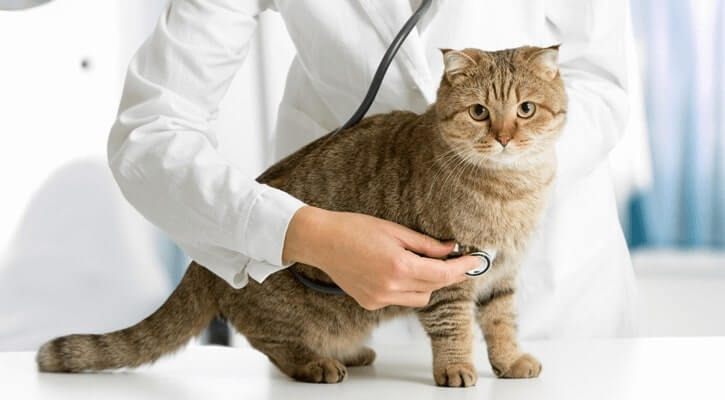
Feline Preventative Care
Cats are like kids–it’s a never-ending job to keep them safe and happy. Routine preventative health care such as vaccinations, viral testing,
While any medical treatment involves some degree of risk, in the case of vaccinations, the benefits far outweigh any potential side effects. Adverse reactions are rare and usually mild and short-term when they do occur.
Which vaccinations and routine screenings should your cat have?
Recommended Vaccines For Cats
Below are the different types of vaccinations and preventative health screenings that we offer and recommend to our feline patients:
Rabies- Considered a “core” vaccination.
Rabies vaccinations are required by law and meant for the protection of people more so than your pet. Rabies is a fatal disease for which there is no cure and our pets tend to be the “middle man” so to speak between humans and Rabies due to their tendencies to come into contact with other wildlife that may be carrying Rabies. Any pet, who is not properly vaccinated for Rabies, who bites, scratches or otherwise breaks human skin in any fashion may be subject to Rabies observation in accordance with the law. A Rabies vaccination is given as early as 12-16 weeks of age and is good for one year. Subsequent Rabies vaccinations are every 1 to 3 years for cats depending on the type of vaccine used. At Downtown Veterinary Clinic, we prefer to use the safest vaccines possible for our patients so majority of our feline patients will receive the non-adjuvanted PureVax Rabies vaccine which is given annually. We use this vaccination in felines to eliminate the risk of vaccine related sarcomas that cats can develop when using regular adjuvanted vaccines.
FVRCP- Considered a “core” vaccine.
FVRCP stands for Feline Viral Rhinotracheitis, Calicivirus and Panleukopenia. These viruses are life-threatening and highly contagious even in the most inclement environment. It is especially important for all kittens to be properly vaccinated in order to stimulate their immune systems to fight off any exposure to these viruses. Typically, kittens will receive their first FVRCP vaccine at 8 weeks and receive additional boosters at 12 and 16 weeks. The minimum number of boosters for a cat of any age who has never been properly vaccinated for FVRCP is a series of two vaccines, given 1 month apart, followed by an annual booster. At Downtown Veterinary Clinic, we practice a 3-year protocol for FVRCP, so after your pet has received their first annual booster, they will only need
Feline Leukemia Virus (FeLV)- Considered a kitten “core” vaccine and an adult lifestyle vaccine.
Feline Leukemia is a non-curable virus that is contagious to other cats. For indoor-only cats, the risk of contracting FeLV is very low. Outdoor cats and cats in multi-cat households are more at risk, especially if they share water and food dishes and litter boxes. Exposure to infected cats raises your cat’s risk of contracting FeLV, especially for kittens and young adult cats. Older cats are less likely to contract the infection because natural immunity increases with age. In accordance with the recommendations of the American Association of Feline Practitioners, Downtown Veterinary Clinic recommends all kittens be vaccinated against Feline Leukemia, regardless of their lifestyle. The FeLV vaccine series consists of two vaccinations, 1 month apart and boosted 1 year later. After their annual booster, we will re-evaluate your cat’s lifestyle with you to determine if continuing annual vaccination for feline leukemia is necessary. All cats must be tested for Feline Leukemia prior to vaccination. This is a quick 10-minute test that requires only a small blood sample. More information about testing is below.
Recommended Cat Testing
Viral (FeLV) Testing- Preventative care screening.
Feline leukemia (FeLV) is a disease that only affects cats — it cannot be transmitted to people, dogs, or other animals. FeLV is passed from one cat to another through saliva, blood, and to some extent, urine and feces. Kittens can contract the disease in utero or through an infected mother’s milk. The disease is often spread by apparently healthy cats, so even if a cat appears healthy, it may be infected and able to transmit the virus. The virus commonly causes anemia or lymphoma, but because it suppresses the immune system, it can also predispose cats to deadly infections. Yet, exposure to the feline leukemia virus doesn’t have to be a death sentence; about 70% of cats who encounter the virus are able to resist infection or eliminate the virus on their own.
Downtown Veterinary Clinic recommends all kittens be screened for FeLV as well as any adult cats who have not been tested before, regardless of lifestyle.Outdoor cats or any cat at increased risk for these viruses should be tested annually. Knowing your cat’s viral status is very important as it may affect your cat’s ability to fight disease and infection should they ever become sick.
Fecal (Stool Sample) Testing- Annual preventative care testing.
Fecal testing screens your cat for various intestinal parasites such as Roundworms, Hookworms, Whipworms, Tapeworms, Coccidia and Giardia. These parasites are contracted through fecal-oral ingestion by a number of ways including grooming, contaminated soil, and contaminated water. Other ways they can be contracted is ingestion of rodents or fleas. Intestinal parasites can cause diarrhea, vomiting, lethargy, inappetence and weight loss. Kittens are especially sensitive to intestinal parasites and they can make them very sick very quickly. All kittens should have their stool tested for parasites when they first come in to see us along with a second follow up test at some point before completing their kitten vaccination series. Prophylactic deworming for common parasites in kittens is also performed even in the event of a negative fecal test. We recommend all adult cats have their stool tested at least once yearly even for indoor-only cats.
Internal and External Parasite Prevention
Cats are just as susceptible to internal and external parasites as dogs are such as roundworms, hookworms, tapeworms, whipworms, giardia,
Cat Preventative Care In Milwaukee
To Make An Appointment for preventative care for your cat, contact us today!

